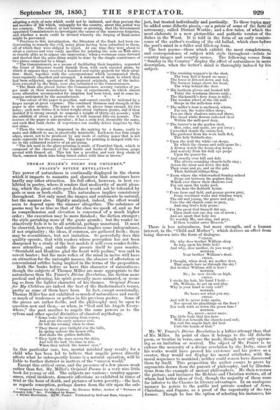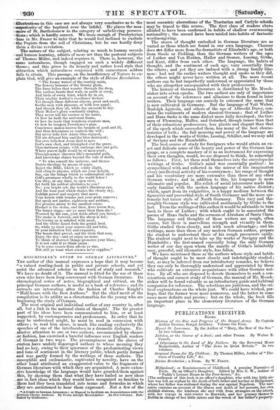DIE power of naturalness is continually displayed in the charm
which it imparts to manars and character that sometimes have hardly any other attraction. Its full effect, however, is best ex- hibited in poetry, where it renders that mediocrity of merit pleas- , which the great critic-poet declared would not be tolerated by gods or men or book-stalls. This naturalness implies consistency throughout. Not only must the images and sentiments be natural, but the manner also. Rigidly analyzed, indeed, the effect would seem to depend upon the manner altogether. The substance of poems may be as true'as that of the class we speak of, and as far as comprehension and elevation is concerned of a much higher order ; the execution may be more finished ; the'diction stronger ; the style partaking more of the gusto grande ; but the reader in- stinctively feels it to be all artificial, perhaps unnatural. It must be- observed, however, that naturalness implies some independence, if not originality ; the ideas, if common, are gathered fresh ; there may be resemblance, but not imitation. So powerfully does this quality operate, that with readers whose perception has not been sharpened by a study of the best models it will even render feeble- ness attractive, and enable the prosaic itself to pass muster. " Sternhold and Hopkins glad the heart with psalms," was said in covert banter; but the mere reflex of the mind in metre will have an attraction for the untaught masses, the absence of affectation or conventional artifice being implied in the terms of the proposition.
Both the ,books before us have this character of naturalness ; though the subjects of Thomas Miller are more appropriate to the naturalness than Mr. Frazer's Divine Revelation, his diction more poetical and pleasing, his spirit generally more animated, or seem- mg so from the lighter character of his themes. . Original Poems for My Children are indeed the best of the Basketmaker's verses, pretty as some of them have been. In fact, except occasionally, Thomas Miller has not exhibited so much of naturalness and rarely so much of tenderness or pathos in his previous poetry. Some of the pieces are rather feeble, and the philosophy may be open to question now and then,—as when, in " God and his Angels Every- where," the poet ascribes to angels the same powers as to the sylvan and other special divinities of classical mythology.
" Some wake the morning from repose,
And scent the early summer rose, Or tell the evening when to close.
" They throw grey twilight o'er the hills, In spring unloose the frozen rills, And shake the golden daffodils.
" They light the stars across the skies, And tell the lark 'tis time to rise, When they unlock the daisies' eyes."
In this particular case, too, mental mischief may result ; for a child who hai been led to believe that angelic power directly affects what he subsequently learns is a natural operation, will be liable to further distrust in matters of the "unseen world."
Fzicept this critical error, and the presence of a few pieces weak rather than fiat, Mr. Miller's Original Poems is a very nice little book for young or old. The subjects are various : country appear- ances, final incidents, domestic affections as exhibited in times of trial or the hour of death, and pictures of town poverty,—the last, as regards conception, perhaps drawn from the stir upon the sub-
• Original Poems for My Children. By Thomas Miller, Author of " Pictures of Country Life," &c. PubiWied by Bogue.
. + Divine Revelation. B Frazer. Published by Bell and Bain, Glasgow.
ject,- but treated individually and poetically. To these topieAngiy be added some didactic pieces —as a precis of some of the he of astronomy, called Distant Worlds; and a few tales, of which the most elaborate is a new pieturelike and pathetic version of the
i Babes in the Wood. It is told in the form of an early reminis- cence of the author's reading of the old ballad, which rises before the poet's mind in a fuller and filled-up form.
The best poems—those which exhibit the most completeness, and correspondence of subject with style throughout—relate Jo country images and country scenes. The following verses., from " Sunday in the Country" display. the effect of naturalness in mere description, when the writer's mind is thoroughly imbued by his subject.
" The creaking waggon's in the shed, The busy flail is heard no more The horse is littered down and fed, The harness hangs above his head, The whip behind the door.
" His leathern gloves and hooked bill Today the woodman throws aside ; The blacksmith's fiery forge is still ; The wooden wheel of the old mill Sleeps in the mill-dam wide.
" The miller's boat is anchored, where, Far out, the 'water-lilies sleep ; You see their shadows mirrored there, The broad white flowers reflected clear Within the mill-pool deep.
" The barrow's in the garden shed, Hoe, rake, and spade, are put away ;
Unweeded stands the onion-bed,
The gardener from his work hath fled, This holy Sabbath-day.
" Upon the wall the white cat sleeps, By which the churns and milk-pans lie ; A drowsy watch the house-dog keeps, And scarcely from his dull eye peeps Upon the passer-by.
" And sweetly over hill and dale The silvery-sounding church-bells ring ; Across the moor and down the dale They come and go, and on the gale Their Sabbath tidings fling.
" From where the whitewashed Sunday-school Peeps out between the poplars dim, Which ever throw their shadows cool Far out upon the rushy pool, You hear the Sabbath hymn.
" From farm and field, and grange grown grey, From woodland walks and winding ways,
The old and young, the grave and gay, Unto the old church come to pray, And sing God's holy praise.
"For the great God himself did say, Thou shalt rest one day out of seven ; And set apart that holy day To worship Me, and sing, and pray, If thou wouldst enter Heaven."
There is less naturalness, but more strength, and a human interest, in the "Child and Mother"; which derives an effect from being thrown into the form of dialogue. " mum.
Oh, why does brother William sleep So long upon his little bed? And why, dear mother, do you weep ?
MOTHER.
Your brother William's dead. CHILD.
I thought, when dead, my mother dear, That angels bore us through the sky ? But brother William still is here?
MOTHER.
No; he now dwells on high.
CHILD.
I stroke his hair, his hand I hold— Oh, William, do get up and play. Why is your hand so very cold?
MOTHER.
He hears not what you say.
CHILD.
And will he never wake again, Nor spread his playthings on the floor ? Nor walk with us down the green lane ?
MOTHER.
No, never—never more.
The little body that lies here Will rest beneath the church-yard sod ; His soul the angels back did bear Unto the hands of God."
Mr. W. Frazer's Divine Revelation is a loftier attempt than that of Mr. Miller. In point of class it belongs to the old didactic poem, or treatise in verse, once the mode, though now only appear- ing as an imitation or revival. The object of Mr. Frazer is to enforce the necessity of a divine revelation by the Deity, since if his works would have proved his existence and his power as a creator, they would not display his moral attributes, with the moral sequences to mankind ; neither could reason have discovered them by itself. This proposition the author essays to prove by arguments drawn from the pursuit of philosophy, and by illustra- tions from the example of ancient philosophers. He then reverses the picture, and instances the Hebraic and Christian writers, all of whom had better ideas of God, though the majority of them were far inferior to the Classics in literary advantages. In an analogous manner he points to the public and private conduct of Jews, Christians, and Pagans, as a proof of the superiority of the two former. Though he has the option of selecting his instances, his '..Allubtrations in this ease are not always wry conclusive' as to the %superiority-of the baptized over the infidel. He places the mas- qsaore of St. Bartholomew in the category of unbelieving perseeu- *Ions ; which is hardly correct. We trace enough of 'Presbyterian • bias in Mr. Frazer to infer that he would feel inclined to exclude the Papists from the roll.of Christians, but he can hardly deny them a divine revelation.
The nature 'of the subject, relating so nmeh to human records and human learning, admits of more art than the pastoral subjects ..,ef Thomas 'Miller, and indeed requires it. There is, however, the same naturalness, though engaged on such a widely different • theme; and this gives to its homely and rather level style that attraction which naturalness conjoined with earnestness seldom fails to attain. This passage, on the insufficiency of 'Nature to ex- plain God, will give an example of the style of Divine Revelation.
" The foamy waters of the roaring main, The flowery honours of the bloomy plain, The fling tribes that wander through the deep, The various beasts that walk on earth or creep, And birds of every kind, which fly in air, Their mighty Author's excellence declare. Yet though these different objects, great and small, Soothe man with pleasure, or with fear appal; And though they all, while day succeeds to day. Their Maker's glory constantly display, They never tell his essence or his name, Or how he built the universal frame Or how he made that wondrous creature man, Or how he tempers Providence's plan. Conscience makes known the bounds of good and ill, And thus determines or controls the will ; But never tells how Adam bliss enjoyed, Till sin debased him and the bliss destroyed; Nor ever tells how Jesus died to save God's own elect, and triumphed o'er the grave. Thus darkness reigns, with umbrage dire and pale, Where purest light would be of most avail; Thus ignorance- obscures life's mournful path, And knowledge shines beyond the vale of death, " Ye who consult the universe, and thence Derive theology by means of sense, Reject the Bible, which ye coldly slight, And cling to physics, which are your delight, Say, can the things which ye contemplate show
God's greatness wholly to the world below ? Can they' at any time, in open view,
Set forth his noblest attributes to you ? No ; yon bright orb, the world's illustrous eye, And the loud peal which shakes the cloudy sky, Exhibit power and majesty that move Your hearts with wonder and your pride reprove ; But speak not justice, righteous and sublime,
Nor promise mercy to the smallest crime. Hushed is the storm, and then, from terror free,
The linnet sings,—are ye more blest than she ?
Warmed by the sun, your fields afford you bread,—
The snake is fostered, and the sheep is fed ;
The lowing ox is satisfied with meat,
And the blithe lizard feels the genial heat. So, while ye trust your axioms old and trite, Or your induction full and exquisite The beasts that grovel, and the birds that soar, Enjoy the day—and ye enjoy no more. To think of abstract things promotes your bliss ; It is not solid if ye think amiss
Up to some causes from effects ye rise, But still ye want what science ne'er supplies."



























 Previous page
Previous page